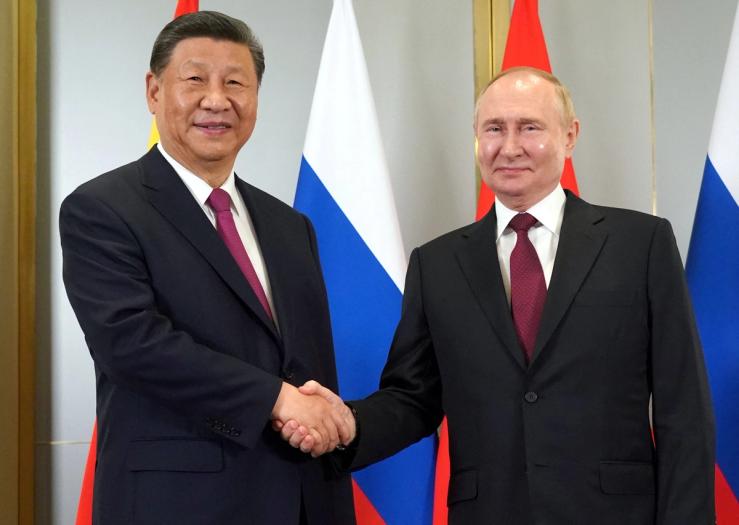The News
China’s Xi Jinping meets with Russia’s Vladimir Putin on Wednesday for the second time in as many months during a visit to Astana, Kazakhstan. The pair are in town to attend a two-day Shanghai Cooperation Organisation summit.
The SCO, formed by Russia and China in 2001, is a security and economic alliance designed to counter Western organizations, like NATO.
The leaders will discuss “further deepening multifaceted cooperation within the organization,” the Kremlin said in a statement.
Belarus is also expected to join the SCO, which would bring its number of member states to 10.
SIGNALS
The SCO is a global stage for Beijing
The SCO has expanded from its origins as a Central Asia-focused alliance to a Eurasia-wide organization with “ever-growing ambitions,” from counterterrorism to economic development, to regional security, a correspondent noted for Radio Free Europe. Symbolism is as important as policy, if not more, and for Beijing, it is particularly so: China has sought to use the SCO to contest the US on the world stage and portray itself as the natural leader of the Global South. But Beijing would need to do a lot to shed the SCO’s reputation “as a talk shop for authoritarians” for China or Russia-skeptical Global South countries to join.
Russia and China are carefully jockeying for influence in Central Asia
Beneath Russia and China’s “no limits” partnership, there lurks a spirit of competition. As Moscow’s influence in Central Asia slips, Beijing is upping its efforts to deepen trade links with countries like Uzbekistan, The Wall Street Journal reported. Part of the reason for the changing balance of power may be Russia’s invasion in Ukraine; that could be ample impetus for other former Soviet republics’ to de-Russify, making “the process of replacing Russia [with China] happen more quickly,” a researcher at the Carnegie Russia Eurasia Center told The Guardian. Russia, meanwhile, seems keen on forging its own diplomatic path:Putin’s recent trips to North Korea and Vietnam may be signaling to China and Central Asia that “[he’s] got other options,” an expert told The New York Times.
Belarus’ membership could shift the alliance in subtle ways
The likely addition of staunchly pro-Russian Belarus into SCO could “dilute its focus,” and damage what little credibility it had with democratic countries elsewhere, a columnist argued in The Diplomat. But since China’s relations with the US have deteriorated, it may be less concerned about presiding over a bloc branded as anti-Western, an expert told CNN. Nevertheless, the SCO’s past embrace of Iran, and now Belarus, could fuel unease among other members that do want to maintain good relations with the West, fostering a kind of “multi-trajectory diplomacy,” another expert added.



